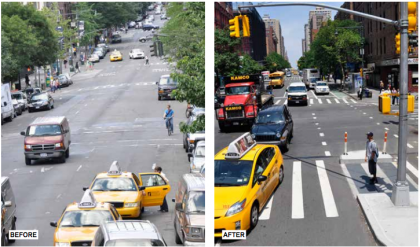
lane-narrowing project that seems to have helped
boost retail sales.
(Photos: NYCDOT.)
The bike links from around the world that caught our eyes this week:
Road diet prosperity: Removing auto travel and parking lanes regularly boosts retail sales when the space is used to create public plazas, bike lanes and pedestrian islands. “Better streets provide benefits to businesses in all types of neighborhoods, from the central business district to modest retail strips in residential areas,” the NYCDOT-funded economic report concludes.
Effective cities: My favorite bit of advice on this list of the “seven habits of highly effective cities” when it comes to building bikeways is #2: “Don’t talk about bikes.”
@BicycleLobby speaks: After reading this hilarious, anonymous interview with the (a?) person behind the @BicycleLobby Twitter feed (“There were at least 36 other Janette-Bots before we made one that was lifelike enough to fool Michael Bloomberg”), Jonathan and I are now taking bets on whether this is a side project for Bike Snob Eben Weiss. (He says yes, I say no.)
Danger in numbers: Something strange is happening in San Francisco: bike-related fatalities have been rising in proportion to biking, at least in the short term. It bucks the “safety in numbers” trend seen in Portland and elsewhere.
Myth buster: Suburbanites tend to be healthier than city slickers. Two out of three Americans both lives and works in suburbia. “The idea of the food desert is largely fiction.” MIT’s Alan Berger wants to burst your bubble with those and other statements in a big new report about urban planning and public health.
Mainstreaming biking: “To get people to cycle, you need to make them feel safe, but you also need to make other forms of transport slower and less comfortable,” opines The Economist, somewhat persuasively.
E-bike sharing: Copenhagen’s new bikesharing system is the first to include electric pedal assists. All bikes also have car2go-like computer screens that let users map their trips, buy transit tickets and (crucially) deliver messages to users of where they can drop a bike off in order to receive a credit and keep the system balanced.
Hiring tip: Want to know what someone will be like as an employee? Watch how they ride a bike, says Lucy Kellaway.
Density choices: East Portland is full of cheap, dense rental housing not because that’s where poor people want to live but because of “a deliberate choice made by city planners and elected officials nearly 20 years ago” to zone such housing there rather than in Southwest Portland, where wealthy residents organized against it.
Milwaukie path: The final leg of the Trolley Trail connecting Gladstone and the Springwater Corridor will be completed by TriMet under a deal made final last week.
Red tape spillover: The federal Department of Transportation wants to reclassify every New York bike project as “construction,” triggering a new layer of state oversight and threatening to slow installation by two years per project.
Sadness machines: “Cars were the visual elements most strongly associated with sadness” in a web game that asked people to rate how various city scenes made them feel.
Fighting PTSD: A Marine combat veteran has founded a new nonprofit dedicated to helping people treat post-traumatic stress disorder by getting on bikes.
Recklessness victims: New York City has a chilling new ad campaign against reckless driving that puts faces on its victims.
Street-safety activism: Direct action enthusiasts may get inspiration from the new website of this resurrected NYC organization.
Comp plan deadline: Got thoughts to share on a specific long-term Portland plan? Get your comments in by year’s end next Tuesday.
Bike gastronomy: A San Francisco journalist takes a quick look at biking, drinking and eating tasty food in Portland and concludes that, yes, they go together nicely.
Advocacy merger: The slightly more transportation-focused Bike Austin is about to merge with the slightly more recreation-focused Austin Cycling Association — a trick the three national advocacy groups failed to pull off last year.
Federal turnover: The departure of two top officials at the U.S. Department of Transportation, including the very bike-friendly John Porcari, has national advocates worried.
Biking CEO: A little bird (OK, it was Bikehugger’s Twitter feed) told us that the new boss at the health-focused Gates Foundation, Susan Desmond-Hellmann M.D., M.P.H., is a big mountain and road biker.
If you come across a noteworthy bicycle story, send it in via email, Tweet @bikeportland, or whatever else and we’ll consider adding it to next Monday’s roundup.

